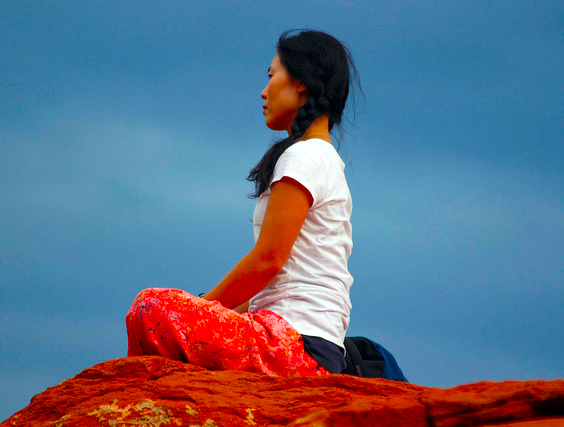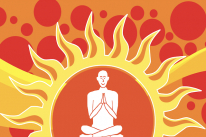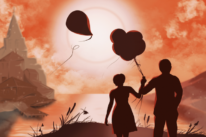“Peace cannot be kept by force. It can only be achieved by understanding.” ~Albert Einstein
I sat in the waiting room of the dermatologist’s office waiting to be seen. For years I have had skin problems, from fungal infections to dermatitis. But when my dentist noticed an indentation the size of a mosquito bite on my upper lip that had not healed in the five weeks since I had seen her, she sent an urgent message to my primary care physician.
The next day, I was seen by my primary care physician and referred immediately to a dermatologist. The medical receptionist handed me a piece of paper with a big green dot next to the words “cancer screening.”
The word “cancer” brought up all sorts of images: throwing up, losing hair, and sometimes death.
Years ago, I was diagnosed with pre-cancer. Had it finally developed into the real thing?
There were two other patients in the waiting room. An older woman with yellow tinted sunglasses and a full head of wavy gray hair sat completely absorbed reading a magazine article.
A younger woman with long brown hair clutched an explanation from the medical billing department about the cost of other services, but no matter how many times she glanced at the paper, her gaze quickly flickered away, as if she was preoccupied with other thoughts.
Had she also come to discover whether or not she was cancer-free?
An undercurrent of agitation swam beneath the waiting room calmness, and I closed my eyes briefly and practiced breathing.
When I was in my twenties, my mind and body wellness doctor mentioned I had a tendency to hold my breath during crucial moments, locking emotions into my body long after the event had taken place. The key was to remember to breathe during those big moments and let the feelings flow through me instead of getting stuck.
I thought about dying and realized I was not afraid to die. I was at peace with myself and how I had lived my life.
Sure, I thought about the practical things: bills, savings, and life insurance. I also thought about the impractical things: husband and children. I even thought about my legacy: my books and my paintings.
If I died, I had enough life insurance to pay off the mortgage and allow my husband time to remarry. If I died, my children would finish growing up without a mother but not without mother-figures. If I died, the books and paintings would go on to entertain and delight others.
What surprised me most was I didn’t have an urgent need to execute a bucket list if I was told I had only six months or a year to live. I felt no desire to quit my job, travel the world, or race a formula one car. I would go on as I had always done: following the same routine every day until there were no days left.
Why?
Over the years, I had abandoned the emergency living I was accustomed to as a young adult in favor of the one-day-at-a-time practice of mindfulness I had adopted as a middle-aged woman.
Gone were the spontaneous forays into carpe diem that led me down selfish roads that hurt the ones I loved.
Gone were the days when I would miserably brood over the things others had done to hurt me, whether unknowingly or intentionally. Gone were the fantasies of a life full of adventure at the expense of abandoning a disabled child I struggled to love.
Now carpe diem translated into loading the dishwasher for my tired husband although it was his assigned chore. Now I no longer brooded miserably over hurt feelings, but said something immediately to diffuse misunderstanding. Now I no longer pined for foreign adventures, but cherished spending quiet moments with my disabled son.
Sure, I had moments of discontent. Who doesn’t? But a fight with my husband no longer propelled me into arms of another man.
Sure, I still envied people who could travel to foreign countries without rearranging the lives of everyone around them. But I found contentment in reading about their adventures, knowing how exhausting it already was to hire and train a respite worker to care for my son just so my husband and I could have a night out.
Sure, I still had hopes and dreams for a life of abundance, but I was no longer going to discount the blessings I already had.
If I did have cancer and if I did die from it, I would not change a thing in my life.
I was not afraid of dying. Dying meant leaving my body, a habitat everyone must eventually leave. Who was I to ask to have my body forever?
No one knew what exactly happened to the soul, but I suspected it would transcend whatever limits the body had imposed on me. If nothing else, I would live on through the ones I had left behind and their lives would become inextricably connected with mine.
When the nurse called my name, I stood up and went into the examination room. The dermatologist arrived shortly thereafter and examined me.
He didn’t know whether or not the skin abnormality was cancerous or not, but he wanted me to try an experimental drug for one month before performing a biopsy and authorizing further treatment.
I left the doctor’s office without a firm diagnosis. I still don’t know whether or not I have cancer. And, frankly, it doesn’t matter whether or not I have it or whether or not I will die from it.
What matters is the life I have been given.
None of us knows when our time on this planet will be up. But we all know we have choices on how we live the moments that have been given to us right now. Our thoughts and our actions illuminate who we are and what we have to give.
Each moment, no matter how seemingly insignificant, is wrought with hope and faith and love.
Breathe in, breathe out. You cannot be afraid if you live in peace.
Photo by Frank Volachek
About Angela Turpin
Angela Lam Turpin is an author and an artist. Her published work includes three novels: Legs, Blood Moon Rising, and Out of Balance, and a short story collection, The Human Act and Other Stories, published by All Things That Matter Press. Connect with her on Facebook, Twitter or her website: www.angelalamturpin.com.














 Though I run this site, it is not mine. It's ours. It's not about me. It's about us. Your stories and your wisdom are just as meaningful as mine.
Though I run this site, it is not mine. It's ours. It's not about me. It's about us. Your stories and your wisdom are just as meaningful as mine.
Thank you for this wonderful article. Interestingly enough, I have been going through almost the exact situation.The fear of dying from skin cancer has infested my days and thoughts. Your article brought me much peace and hope. Thank you.
You are welcome.
I expected a corny article. It wasn’t. I believe in the values that you shared, and given your life experience, I’m sure your experience is real. I hope one day I can be as serene as you are in front of death. Thanks.
I am sure you will get there. You sound like you are on the right path.
“If I died, I had enough life insurance to pay off the mortgage and allow my husband time to remarry.”
By the sounds of things you are an incredible person! I highly doubt your husband would even consider remarrying!
Thank you for a great post @GrowthGuided
You are too sweet.
Very powerful article. I have dealt with cancer all too often in my short 25 years on this earth, but one thing it definitely provides is perspective. Sometimes it takes difficult situations to make us ask the difficult questions to ourselves in life. It sounds like you have definitely achieved mindfulness in daily living, thank you so much for sharing.
Dave @personalgrowthproject
Hi David. It sounds like you’ve lived through more than enough and have your own wisdom to share. Looking forward to hearing more from you.
Wow! That was powerful! I really hope you are okay! You are so much braver than most of us….in fact, reading your story makes me feel stronger with my current issues. I really wish you luck, health and happiness!!!
Thanks Michelle. Waking up each morning knowing it is a gift changes everything. Enjoy each moment. You are stronger than you give yourself credit for.
Beautiful post Angela! You are inspiring too! I hope this finds you doing well!
Wow. I am sitting here after reading this with tears in my eyes. Your peace, acceptance and your journey towards it really resonated with me. Perhaps I am still in the ’emergency living’ stage, for I do not have what you have, but I am extremely inspired by your words and thank you from the bottom of my heart. Peace.
Out of everything I have read on this website, this has affected me the most. Thank you.
I have insipid shit like this. If you’re so fine with not being around then DON’T! We are overpopulated. Make room and free up resources for someone who gives a shit.